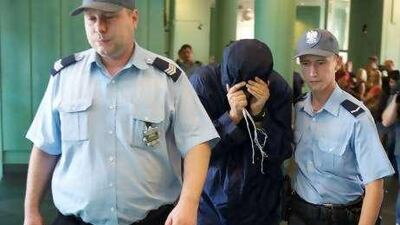BERLIN // German authorities insisted yesterday that they had no choice but to release the only suspect arrested so far in the Mahmoud al Mabhouh murder case, and denied that they had been subjected to any political pressure in their decision.
Uri Brodsky, the suspected Mossad agent accused of helping to obtain a German passport for one of the assassins, was released on bail on Friday, days after he had been extradited from Poland. German justice authorities said they had wanted to charge Mr Brodsky on two counts - working for a foreign intelligence service and fraudulently obtaining documents. But the Warsaw court had stipulated that he could only be extradited to Germany if he were prosecuted on the latter charge, which carries a fine only.
Mr Brodsky had been arrested on June 4 on a Europe-wide arrest warrant filed by German federal prosecutors. The document fraud charges were issued in Cologne. "We only had the narrow scope to prosecute him for the document crime, we weren't allowed to use anything else against him," Rainer Wolf, the Cologne prosecutor who handled the case, said. "The Polish justice system doesn't allow the extradition of people for crimes that have a political background. That reduced any prospective sentence, especially if you factor in his time in custody since June 4."
Mr Wolf said Mr Brodsky, who arrived in Israel on Saturday night, could not be forced to return to stand trial in Germany. His presence may not even be necessary because the bail paid was big enough to cover any fine, and the case may be continued in abstentia, Mr Wolf said. "The other charge of intelligence activity will continue to be pursued but not by the Cologne prosecutor's office," he said. "That is up to the federal prosecutor's office. They couldn't do anything because the Poles in effect forbade it."
German prosecutors allege that Mr Brodsky helped one of the suspected assassins to obtain a German passport at a Cologne registry office in the name of Michael Bodenheimer. That passport was used by one of the more than 20 members of the hit squad that allegedly drugged and strangled the senior Hamas leader in his Dubai hotel room in January. The German federal prosecutor's office said Mr Brodsky was "under urgent suspicion of cooperating in obtaining the passport in Germany".
While Mr Brodsky owes his freedom in part to the complex machinations of the European justice system, it will be difficult for Berlin and Warsaw to allay suspicions abroad that political pressure played a part. But Mr Wolf said he and the Cologne court had agreed that Mr Brodsky be released and that no outside influence had been brought to bear on him. "I can say with a clear conscience that I would resist any influence. I'm an independent prosecutor and no one influenced me," he said.
The German foreign ministry dedclined to comment on the Cologne court's decision. "In the Brodsky case the decision taken by the German court responsible was independent and taken purely in accordance with judicial criteria," a ministry spokesman said. "The federal government won't comment on this independent court decision." The spokesman added: "Germany remains determined to contribute to the investigation of the al Mabhouh case."
The federal prosecutor's office could not be reached for comment. Israeli officials had been pushing for Mr Brodsky's release, and the case was causing diplomatic tensions between Israel and its two close allies Germany and Poland. Friday's ruling by a court in Cologne and Mr Brodsky's subsequent swift return to Israel is embarrassing for the German government, which had joined international calls in February for a thorough investigation into the suspected Mossad hit on the Hamas leader in Dubai.
Meanwhile, the EU arrest warrant against Mr Brodsky remains in force. That means that if he were to return to Germany or any other EU nation, he could be arrested again on the charge of intelligence activity, because the confines of the Polish extradition ruling would no longer apply, said Mr Wolf. The agents' use of non-Israeli passports, including a German one, to enter Dubai for the killing led to a chorus of criticism of Israel around the world, although Germany's reaction was noticeably more restrained. Berlin refrained, for example, from summoning the Israeli ambassador to protest.
In Germany, unwavering support for Israel is a firm part of state doctrine because of the Holocaust. Politicians from mainstream parties are wary of criticising Israel for fear this may be construed as anti-Semitism. A report in Der Spiegel, a German news magazine, said the Mossad had tapped into the German sense of guilt to help it obtain the passport, and that this ploy in particular had angered the German authorities.
Allegedly helped by Mr Brodsky, the man calling himself Michael Bodenheimer had told the Cologne registry office that his father, Hans, had emigrated to Israel to escape Nazi persecution, Der Spiegel reported in June. In such cases, the German constitution makes it easy for descendants to gain citizenship. The man calling himself Bodenheimer promptly received his German papers on June 18 2009. foreign.desk@thenational.ae

